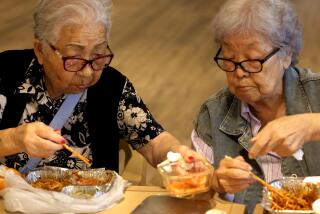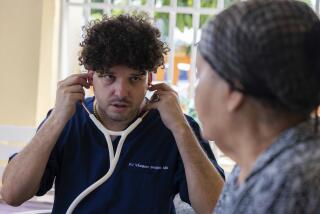Going Home Again Becomes Mission of Mercy for Dr. Jenny
- Share via
Dr. Jenny L. Batongmalaque left her native Philippines more than 20 years ago--before Ferdinand Marcos came to power.She recalls a progressive country that had a sense of justice.
When she went back during the Christmas holidays, Batongmalaque said she was so shocked by what she found in Manila’s slums and in the depressed agricultural province of Negros that she could not talk about it for a few days.
“I was appalled, it was so abysmal,” said the 46-year-old physician, who lives in Rancho Palos Verdes and practices in Torrance and Los Angeles. “That word kept coming back, and I said, ‘How could this have happened?’ ”
She spoke of seeing severe “skeleton and pot belly” malnutrition cases and of families living in shacks built on top of refuse dumps in the sprawling Manila slum of Tondo, which is the size of Torrance.
It was not supposed to be a pleasure trip. Batongmalaque was there with nine other health professionals, including seven other native Filipinos, who are involved in a foundation she heads that seeks to provide humanitarian aid to the Philippines. The foundation was set up last September, after the fall of Marcos prompted her and others to see what they could do to help the troubled country.
Making the trip were three doctors, a public health expert, a nurse, a pharmacist, a psychologist and a medical administrator. They paid their own $1,000 per-person costs, Batongmalaque said.
The group surveyed 1,200 children under the age of 5, she said, and found that 82% of the youngsters in Tondo are malnourished. She said data from other areas the groups visited probably will be comparable.
“Some have that glazed, listless look,” she said. “People think it’s apathy, but it is the listlessness of hunger.”
The team recorded the children’s height, weight and age as well as a family medical and dietary history. In addition, the children were tested for signs of blindness. Incidents of some degree of blindness were almost as high as those of malnutrition, she said.
Aside from malnutrition, the group also found significant levels of pneumonia, various gastrointestinal illnesses and tuberculosis.
“It’s all over the place,” she said, adding that in one area, there was an outbreak of measles and mothers told her the children had not had inoculations for three years.
Although the trip was billed as a fact-finding mission, the group took along a cache of donated supplies that the Philippine health ministry said were needed. Items included medical equipment such as blood-pressure apparatus and surgical instruments, multivitamins, drugs and such basic supplies as disposable syringes, gauze and bandages. Many items were donated by Little Company of Mary Hospital in Torrance.
‘Grass-Roots’ Group
Batongmalaque--known as Dr. Jenny both by her friends and professionally--heads the AMOMA Foundation, which she describes as a “grass-roots” group formed last September to give individuals a way to aid the Philippines in cooperation with the government of President Corazon Aquino. ( Amoma is a Filipino-Visayan word meaning “to assist,” but it is also is being used as an acronym for “Any Manpower or Monies Appreciated.”)
“We formed a foundation in order to make ourselves a credible group on a long-term basis, not just a relief project,” she said.
After analyzing all of its research data, the foundation will decide how it can best help the Philippines, Dr. Jenny said. The foundation wants to be a “conduit of information” for individuals who wish to assist the Philippine people, and may also do projects of its own, she said.
One way it could help, she said, is to raise money and send it to the Philippines for distribution by a civic and church task force--”people we have met and trust.” She also wants to work with the UCLA School of Public Health to develop a proposal for funds through the Child Survival Fund maintained by the U.S. Agency for International Development.
Help Welcomed
Delia Goggins, a Philippine-born registered nurse who went on the trip, said the best approach may be to set up an AMOMA Foundation in the Philippines that would be accountable for donations and supplies that are sent.
Goggins, who lives in West Los Angeles and owns a home health-care service, said Filipinos trying to help their country “welcome help (from outsiders) if it is done in a coordinated manner.”
After obtaining her medical degree in the Philippines and coming to the United States in 1966, Dr. Jenny went into family practice in Torrance and Los Angeles and later became an activist in the Filipino community, which is centered in the Echo Park area of Los Angeles. She is divorced and has an 18-year-old son.
Among other things, she helped start a mobile dental clinic there.
Impossible Under Marcos
Although she went back to the Philippines on three previous visits, Dr. Jenny said something like AMOMA was impossible under Marcos.
“Now we feel that President Aquino is encouraging everybody to help,” she said.
This was echoed by Dr. Elvira Dayrit, executive director of the Council for the Welfare of Children in the Philippines.
“The government welcomes outside people,” she said in a telephone interview from Manila, adding that the greatest needs are for food-producing and -processing equipment so that the country can supply itself.
She said that between 70% and 80% of the more than 10 million Filipino children under the age of 6 suffer some form of malnutrition--about 20% in the moderate or severe categories.
Help From Government
The government is expanding its efforts to feed children, Dayrit said, as well as programs to detect malnutrition and to teach people new ways to earn a living in such places as Negros, where the once-prosperous sugar economy collapsed in the early 1980s. She said the government is feeding 90,000 children there.
Dr. Jenny said that after nearly a year, the Aquino government does not appear to have “even made a dent in the urban poor” in Tondo or in some resettlement communities Marcos set up to get the poor out of Manila.
However, publicity about the plight of the people of Negros--the area hardest hit by malnutrition--is attracting help from all over the world, she said. “Civic leaders (in the Philippines) are highly active in distributing donations. It’s a good thing happening in the community.”
She said press reports calling Negros the “next Ethiopia” are exaggerated. “Food is available all over the place,” she said. “But the lack of buying power is the main cause of malnutrition.”
People Optimistic
People for the most part are optimistic about Aquino, she said, but there is a “wait-and-see” attitude.
“It is hard to fight old, traditional politics, which are alive and kicking,” she said. “Loyalists to Marcos are all over the place and there is general instability.”
As an example, she said she looked into a Tondo hut and “I saw the Serenity Prayer, and beside it, a picture of Marcos. I said: ‘My God, how could anyone love and adore someone who raped them?’ ” But, she said, Marcos offered a dole that made the poor loyal.
Goggins said some people they spoke to on the trip are convinced that corrupt officials already are siphoning off aid intended for the poor. “One said, ‘Please have the aid sent direct, so it is not channeled through the bureaucracy so there is none for us.’ That will be one of our dilemmas in making our recommendations on what we can do,” she said.
Dayrit acknowledged the government’s problem. “Change has been mostly at the top, so the lower-down people have not changed,” she said. “There are complaints about graft and corruption and we are trying to do something about it.”
Return Trip Planned
Dr. Jenny said she will return to the Philippines on Feb. 26 as part of an aid airlift by Project HELP (Hospital Emergency Life, Philippines), a relief project organized by the Hospital Council of Southern California and involving 25 American physicians and other health professionals. The two projects were started about the same time and are coordinating their efforts.
Dr. Jenny said she intends to talk to the minister of health about what AMOMA has learned and what it can do.
“A lot of people need a lot of help out there,” she said.
More to Read
Sign up for Essential California
The most important California stories and recommendations in your inbox every morning.
You may occasionally receive promotional content from the Los Angeles Times.










